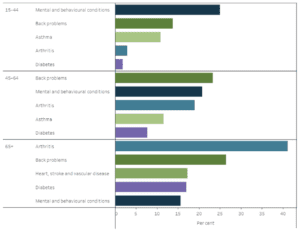Chronic Disease Management: A multifactorial approach
July 25, 2023
Chronic Disease as we know it
Chronic diseases have emerged as the primary drivers of morbidity, disability, and mortality in Australia, accounting for nine out of ten deaths as of 2011 (Australian Institute of Health and Welfare 2011b). This surge in chronic diseases has followed the triumphant mitigation of infectious diseases and infant mortality during the late 19th and early 20th centuries. Advancements in medicine and longevity, alongside evolving lifestyles, have led to a steep rise in chronic diseases, which now shoulder the significant bulk of health concerns.
Chronic diseases, a broad umbrella term, encapsulate a diverse range of health conditions and illnesses. These conditions often coincide, share mutual risk factors and, crucially, co-determine an individual’s health status. Hence, there is enormous potential for amalgamating preventive measures and care approaches to combat multiple chronic diseases concurrently, thereby prolonging health and wellness.
Typically, the discourse around chronic diseases revolves around four principal categories—cardiovascular diseases, cancers, chronic obstructive pulmonary disease (COPD), and diabetes. Outside of these four are 2 other significant complex morbidities; generalised back pain and mental health conditions. These key four groups are often related to four behavioural risk factors—smoking (tobacco use more broadly), physical inactivity, unhealthy dietary habits, and harmful alcohol consumption. Together, these disease groups constitute three-fourths of all chronic disease-related fatalities. However, it is important to note that the impact of chronic diseases is not solely limited to fatalities. For instance, mental health conditions, while not a major cause of death, significantly contribute to ill health and disability within the Australian population. The figure below helps to highlight the most common chronic diseases affecting each demographic throughout their age.
Figure 1: Most common chronic conditions by age in Australia, 2020-21.

Source: ABS 2022b via http://www,aihw.gov.au
Chronic diseases have long been commonplace in Australia and other developed nations. However, their pervasiveness is now escalating in developing nations as well due to rising incomes, plummeting food costs, and increased urbanisation, all of which are driving shifts in diet and lifestyle, culminating in increased rates of overweight individuals and physical inactivity. The common goal of significantly reducing risk factors and prevalence of these conditions is one we are not yet achieving in Western society. This global spread of chronic diseases led to a United Nations assembly in 2013, aimed at reducing chronic disease-related deaths by one-third among individuals aged 30 to 70 by 2030.
How are UN and the World Health Organisation aiding the fight
Known to the World Health Organisation (WHO) as Non-communicable diseases (NCD), they note that every minute, 28 individuals aged between 30 and 70 die prematurely due to an insufficient global response to chronic diseases such as cardiovascular diseases, cancers, diabetes, chronic respiratory diseases, and mental health conditions. The majority of these fatalities, 25 out of 28, occur in low- to middle-income countries that lack adequate protection against the risk factors and repercussions of these non-communicable diseases (NCDs).
The United Nations’ fourth High-level Meeting on the Prevention and Control of NCDs in 2025 will serve as a platform to review the premature deaths since the previous meeting in 2018, projected to exceed 100 million by 2025. The event will also be an opportunity to introduce a new Political Declaration on NCDs, providing a roadmap to guide the global NCD response from 2025 to 2030. In anticipation of this meeting, the World Health Organization (WHO) encourages all countries, NGOs, companies, individuals, and those living with an NCD to back local and global efforts to achieve these results by 2030.
NCD at grassroots
In light of the profound personal, societal, and economic ramifications, the challenge of managing and mitigating chronic diseases is the foremost health priority for Australia. An increasingly comprehensive understanding of the shared underlying causes, features, prevention and management strategies of these diseases, coupled with their rising costs, compels us to rethink and transform our approach towards chronic disease.
CDM Plus
CDM Plus is an Australian owned and operated education provider dedicated to assisting healthcare practices in enhancing their ability to manage patients with chronic diseases, while also promoting activities designed to detect, prevent, and delay these conditions. CDM Plus offers valuable training and resources for General Practitioners, Nurses, Aboriginal Health Workers, and reception staff, with the objective of equipping them to deliver high-quality, long-term management and care coordination for chronic diseases.
Understanding the unique operational differences among healthcare practices, CDM Plus provides a broad range of training options to ensure the most beneficial outcomes for their clients and patients.
The Getting Started short courses offered by CDM Plus consist of a 2.5-hour individual remote training session, facilitated by their seasoned trainers. They utilise your existing clinical software, such as Best Practice, Medical Director, Communicare, Zedmed, and Genie, to bolster your confidence in managing common chronic conditions within primary care.
The course objectives are threefold: firstly, to help you identify risk factors linked with common chronic conditions; secondly, to assist you in recognising the MBS item numbers corresponding to chronic disease management detection and management activities; and finally, to acquaint you with the relevant lifestyle modifications and targets for each chronic condition.
The course structure covers a range of topics, including the prevention, detection, and management of chronic conditions such as Asthma/COPD, Diabetes, Cancer, Osteoporosis, Cardiovascular Disease, and Chronic Kidney Disease. It provides an understanding of MBS item numbers for routine detection and management activities, introduces you to the clinical guidelines for primary care, and offers a deep dive into various case studies. Alongside these learning elements, hard copy training materials are also included as part of the course.
You can find these entry courses at Med CPD here:
https://app.medcpd.com/courses/3166
https://app.medcpd.com/courses/3167
https://app.medcpd.com/courses/3169
Looking to improve patient care with in-person training?
In addition to their remote sessions, CDM Plus is also excited to offer two in-person courses titled ‘Introduction to Chronic Disease Management’ and ‘Advanced Chronic Disease Management’. These courses will be held across all major capital cities in Australia this coming July and August.
The ‘Introduction to Chronic Disease Management’ is a one-day workshop intended for a wide array of medical professionals, including Medical Practice Assistants, Nurses, Aboriginal Health Workers, Practitioners, Nurse Practitioners, Allied Health Practitioners, GPs, and Practice Managers. This course is designed to enhance service delivery in the field of Chronic Disease Management. It offers practical insights and a step-by-step guide on various topics like Medicare, MBS online, CDM item numbers, MBS billing combinations, health assessment and allied health pathways, Home Medicines Review, and more. In addition, participants will be provided with hard copy training materials. The learning objectives include identifying Chronic Disease Management MBS item numbers, understanding Chronic Disease Management processes, and applying learned skills to improve Chronic Disease Management. Book in or learn more at: https://app.medcpd.com/courses/3120
Moving beyond the basics, the ‘Advanced Chronic Disease Management’ workshop delves deeper into the realm of Chronic Disease Management. This one-day face-to-face workshop is also intended for a similar range of medical professionals. It covers Chronic Disease Management for patients with various chronic diseases, including Asthma/COPD, Diabetes, Cancer, Osteoporosis, Cardiovascular Disease, and Chronic Kidney Disease. Additionally, the workshop discusses case conferences for primary care and RACF, complex care, MBS billing pathways, data reporting with your clinical software and other programs, quality improvement, and digital health including My Health Record. As with the introductory workshop, hard copy training materials are also provided. Read more at: https://app.medcpd.com/courses/3125
By attending these workshops, you can expand your understanding of Chronic Disease Management, learn practical applications, and stay abreast of changes in the field working towards the prevention of chronic diseases in the future.
4.2 chronic disease—Australia’s biggest Health Challenge (2014) Australian Institute of Health and Welfare. Available at: https://www.aihw.gov.au/getmedia/8f7bd3d6-9e69-40c1-b7a8-40dca09a13bf/4_2-chronic-disease.pdf.aspx
On the road to 2025 (2022) World Health Organization. Available at: https://www.who.int/teams/noncommunicable-diseases/on-the-road-to-2025












